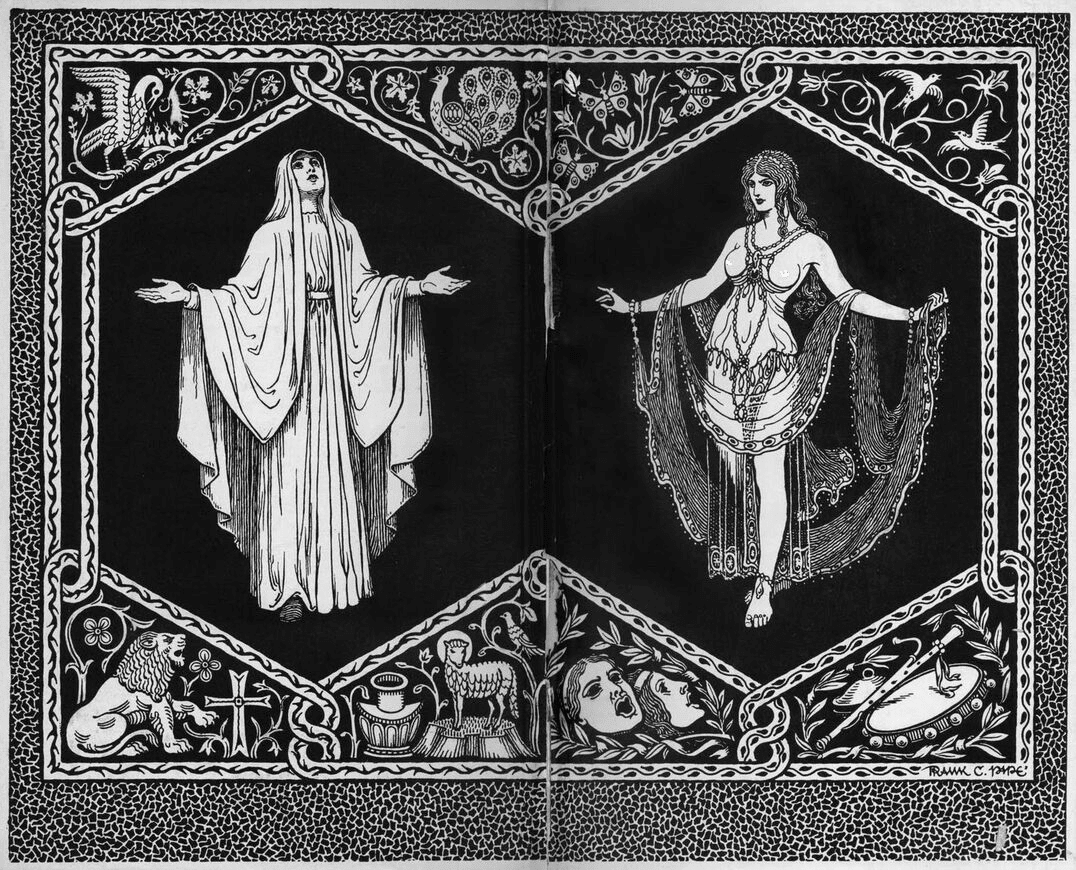Pratima critiques the binary image of women, the Madonna-Whore Complex. The patriarchal society have predefined slots for the far sex. An exclusive for Different Truths.
 “Prostitute. Whore. What did they really mean anyway? Only words. Words trailing their streamers of judgment. I hated labels anyway. People didn’t fit in slots-prostitute, housewife, saint-like sorting the mail. We were so mutable, fluid with fear and desires, ideals and angels changeable through water.” ~ Janet Fitch, White Oleander
“Prostitute. Whore. What did they really mean anyway? Only words. Words trailing their streamers of judgment. I hated labels anyway. People didn’t fit in slots-prostitute, housewife, saint-like sorting the mail. We were so mutable, fluid with fear and desires, ideals and angels changeable through water.” ~ Janet Fitch, White Oleander
Women have always been pictured as hapless beings in several of ancient scriptures and the fact has been reinstated through many literary, historical and anthropological writings, which prove women to be the weaker or rather the non-existent sex. The Indian tele-serials, barring a few new generation serials, largely present us with two opposed images of a woman — the self-sacrificing Sita, the pativrata, the cult of the Parvatis and Tulsis of the famous Balaji tele-series or the scheming, conniving manipulating vengeful vamps, who very often appear in them. Women in any society — be it Western or Indian are hardly conceived of as women. They are either venerated as devis (among the Orient) or Madonna (among the Occident), with the supreme power of self-sacrifice, giving up everything for their family or children, or they are assumed to be whores — fallen women or prostitutes. They are hardly conceived of as human beings with human desires.
Women in any society — be it Western or Indian are hardly conceived of as women. They are either venerated as devis (among the Orient) or Madonna (among the Occident), with the supreme power of self-sacrifice, giving up everything for their family or children, or they are assumed to be whores — fallen women or prostitutes. They are hardly conceived of as human beings with human desires.
This popular image of women in literature, mythology and culture is termed as the Madonna-whore complex. Madonna is another name for the chaste and transcendental Mother Mary and whore means a fallen woman. In our Indian culture, the image projected through the various forms of Shakti — Durga, Kali, Lakshmi — seemingly exalt womanhood and promote them to the stature of the transcendental, the divine, the immaculate Madonna, who can only be worshipped and venerated. The divinity accorded to women, however, snatches them from their ordinary human existence and sees them as capable of worship only when they rise above the level of common humans and become a Goddess. All the ceremonies of Kanya pujan (worship of immature girls who have not achieved puberty) during Navratra (festival of nine nights for the worship of the Hindu Goddesses) rests on the idea that the girls who are invited at home for worship are emblematic of the Goddesses themselves. Apparently, only in this chaste and transcendental form of a ‘devi’ can the girl bring luck and prosperity to the devotees.
And on all other occasions, the girl child is considered to be a burden to her parents, who in their deep desire of a male heir do not hesitate to commit reckless foeticide and even despicable infanticide in some regions of the country. It is hearting to watch that how the girls who rise to the level of Goddesses during Navratri Pujan and Durga Puja and are welcomed with garlands and the auspicious blowing of conch shells, are shamelessly eve-teased, raped and even murdered when they lose their divine identity. The patriarchal mind can only see women as either idol to be worshipped and venerated or fallen women who seemingly invite rape by their smiles, their body shape and conceited innocence.
The idea of Madonna-whore complex originates from psychoanalysis. The concept is a concomitant of patriarchy and the representation of women in myths and literature. A man with a Madonna-whore complex will lust for a sensuous and beautiful woman but he will never respect her if she is tainted, impure and unworthy.
The idea of Madonna-whore complex originates from psychoanalysis. The  concept is a concomitant of patriarchy and the representation of women in myths and literature. A man with a Madonna-whore complex will lust for a sensuous and beautiful woman but he will never respect her if she is tainted, impure and unworthy. Despite having feelings for her, he would only marry a Madonna kind of woman — chaste, domesticated, nurturing and sexually frigid. The latter relationship could be unsatisfying but still, the man would choose the latter due to the societal visualisation of such women as good. How often in our Indian setup have we seen men who lust for a bold, sensuous, outspoken woman but marry a woman who is just her complete opposite — a domesticated, frigid and chaste woman. Thus, Madonna-Whore Complex is not only associated with the psyche, which restricts the autonomy of women, but it also impairs the intimate relationship of men with women.
concept is a concomitant of patriarchy and the representation of women in myths and literature. A man with a Madonna-whore complex will lust for a sensuous and beautiful woman but he will never respect her if she is tainted, impure and unworthy. Despite having feelings for her, he would only marry a Madonna kind of woman — chaste, domesticated, nurturing and sexually frigid. The latter relationship could be unsatisfying but still, the man would choose the latter due to the societal visualisation of such women as good. How often in our Indian setup have we seen men who lust for a bold, sensuous, outspoken woman but marry a woman who is just her complete opposite — a domesticated, frigid and chaste woman. Thus, Madonna-Whore Complex is not only associated with the psyche, which restricts the autonomy of women, but it also impairs the intimate relationship of men with women.
A woman is insidiously deprived both from sexual fulfilment and spiritual transcendence. The desire for sexual fulfilment labels her as a prostitute and depraved being — ‘the whore’ and spiritual transcendence is viciously kept beyond her reach as she is nailed to the drudgery of domesticity. The great 20th-century novelist, D.H. Lawrence, intends to prove in most of his works that only a woman can lead a man to salvation; that it is only through sex with a woman that a man can achieve transcendence. But nowhere in his works, is the spiritual advancement of a woman discussed. It is falsely projected that a woman is happy in her domestic sphere and transcendence and spiritual advancement is and can be guaranteed for a man only.
To divide the multiple facets of a woman would be akin to dividing the different aspects of a human being. One must realise that all humans are a mixed yarn of good and evil. While the males are exempted from being judged, women are constantly weighed and measured on the balance of chastity and purity. How many more centuries will have to pass before women are seen as humans susceptible to blemishes, failures and flaws!
 This act of violence done on women by portraying her into two stereotypical images is highly unjust but still is believed by a large number of people. Advertisements in newspapers for a soft-spoken grih karya daksha (adept at household chores) and simple wife bear testimony to this mindset. To divide the multiple facets of a woman would be akin to dividing the different aspects of a human being. One must realise that all humans are a mixed yarn of good and evil. While the males are exempted from being judged, women are constantly weighed and measured on the balance of chastity and purity. How many more centuries will have to pass before women are seen as humans susceptible to blemishes, failures and flaws!
This act of violence done on women by portraying her into two stereotypical images is highly unjust but still is believed by a large number of people. Advertisements in newspapers for a soft-spoken grih karya daksha (adept at household chores) and simple wife bear testimony to this mindset. To divide the multiple facets of a woman would be akin to dividing the different aspects of a human being. One must realise that all humans are a mixed yarn of good and evil. While the males are exempted from being judged, women are constantly weighed and measured on the balance of chastity and purity. How many more centuries will have to pass before women are seen as humans susceptible to blemishes, failures and flaws!
Simone De Beauvoir points out that just as there is no such thing as the “eternal masculine,” there is no such thing as “eternal feminine.” Or, to put it differently, “here is no essence, only experience.” All beings, de Beauvoir insists, have the right to define their own existences rather than labour under some vague notion of “femininity.” (De Beauvoir, The Second Sex)
Photo from the Internet





 By
By
 By
By
 By
By
 By
By
Quite insightful article that highlights the dual standard of patriarchal society along with prostitute’s deplorable status in society that works as a “safety valve. “
Thank you so much Ashish